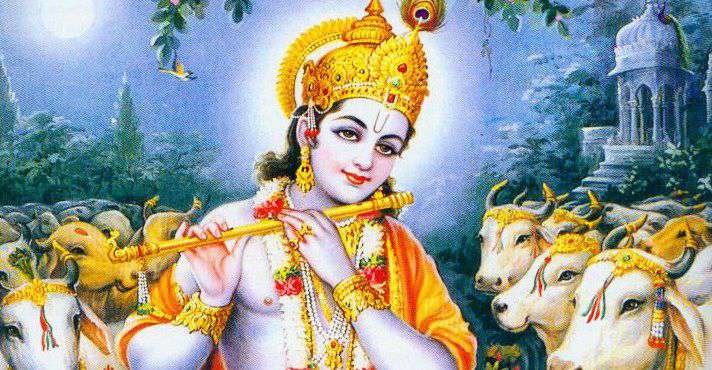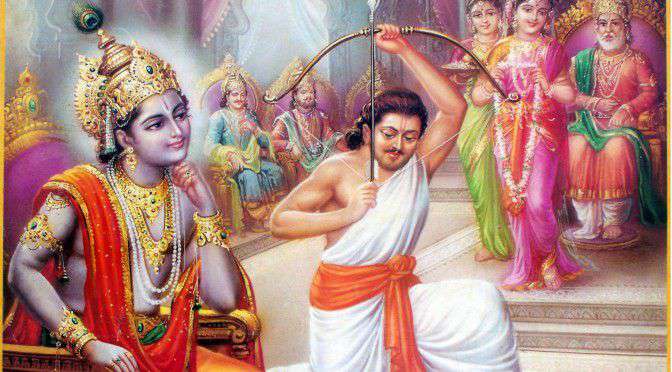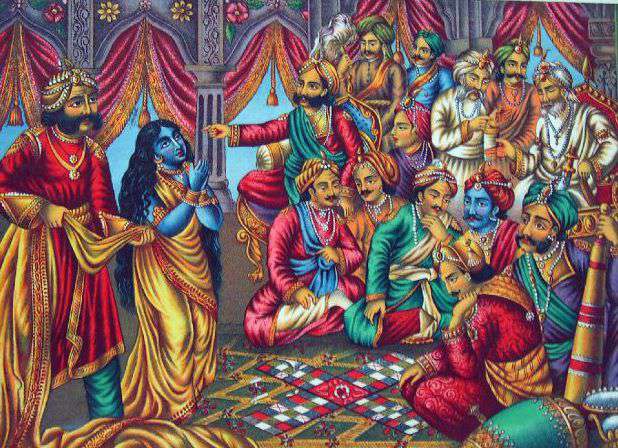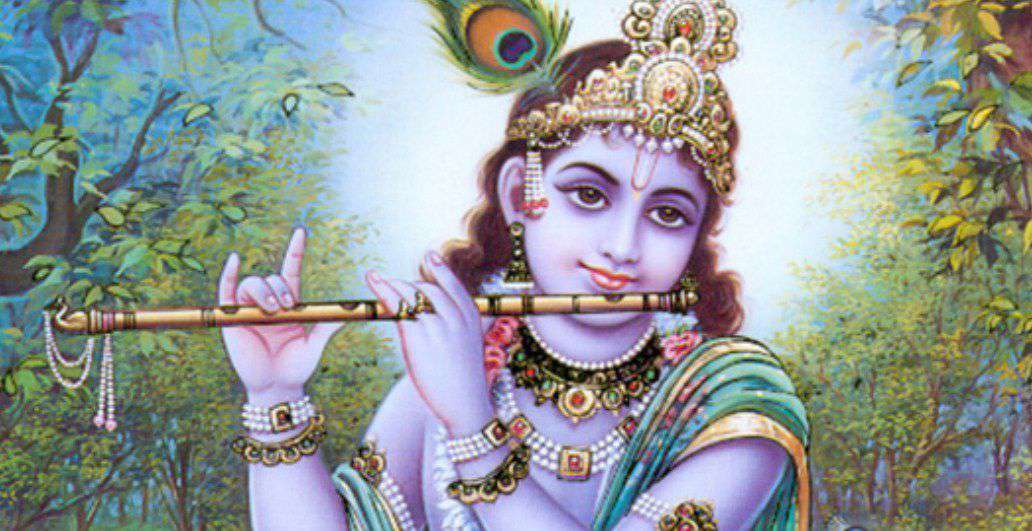Bhagwan Krishna’s life presented in Hindu scriptures can be divided into 3 phases – The Earliest life, the Family life and the Public life. In the tenth Skanda ( the tenth book under Srimad Bhagavatam), Vyasa Rishi describes to us the earliest life of Krishna and his homely life, more generally known as his personal life. Ranging from the birth of Shree Krishna until the death of Kamsa defines the early stages of Krishna’s life. Krishna’s rendezvous with Virasunda, the time till he married Rukmini, the divine incarnation of Lakshmi Devi, and furthermore, also his meeting with the certain local kings, represents his family life.
However, the public or social life of Krishna is majorly shown and found in the epic Mahabharata. It isn’t available in Gita, Purana or any other manuscript. Rishi Vyasa has beautifully distinguished between the early family life and later public life, defining only the family life in Shrimad Bhagavatam, and the public life in Mahabharata. The complete essence of Krishna’s life is truly found when one reads both Shrimad Bhagvatam and Mahabharata. Thus, it can be said that Mahabharata follows Shrimad Bhagvatam.
 We know for a fact what Vyasa has written about Sri Krishna in the Tenth Skanda of the Srimad Bhagavatam. However, the marvellous descriptions and explanations of the Skanda can be further appended with the other phases of Krishna’s life, which is seen in Mahabharata. Without these explanations, few of the most significant aspects of Krishna’s life will be completely left out from the world.
We know for a fact what Vyasa has written about Sri Krishna in the Tenth Skanda of the Srimad Bhagavatam. However, the marvellous descriptions and explanations of the Skanda can be further appended with the other phases of Krishna’s life, which is seen in Mahabharata. Without these explanations, few of the most significant aspects of Krishna’s life will be completely left out from the world.
Bhagavatam and Mahabharata completely differ in their transcriptions. One can only realize and make out this difference when you read it and understand it. The way an epic is created is completely distinguishable from the Purana’s style of definition. The style of writing an epic is a bit soaring and lifted. An altogether different kind of powerful emotion inflicts us while reading Mahabharata, rather than a feeling.
We can comment that Rishi Vyasa wrote about the life of Lord Krishna in Mahabharata solely to present to the world the characteristic of a man who lived the most unselfish life of perfection. It is the core of actions and those actions that doesn’t bring any good to one’s own self. This defines the gist of unselfish perfection in action. Mahabharata gives this gist to us in a resonant, rejuvenating and soulful way.
The early life of Sri Krishna begins when the God’s prayed to the divine forces to descend to the Earth, taking avatars, creating various lilas, passing humanly emotions and tests, until the banishment of the tyrannous Kamsa. Then commences the more active stages of Krishna’s life in society where he is bound to set right the various anomalies and errors created in contemporary world. This includes the battles of Mahabharata and Krishna’s intervention into the epic at various points. It is from these interventions that we get our most celebrated and guiding mythology, the verses of Bhagavad Gita.
Bhagwan Krishna in Draupada’s court

Krishna’s presence is firstly seen in Mahabharata at the Adi Parva, the ceremony at king Draupada’s court for his daughter Draupadi’s Swayamwar. He was silently seated at one corner in the court. The court was then witnessing the presence of thousands and hundreds of kings and princes who gathered to woo and win Draupadi’s hand. Krishna however, was a witness. It is evidently known to the world that even after many kings attempted, Arjuna succeeded in winning. There were all the Pandava brothers seated in Draupada’s court disguised as Brahmins. Pandavas were exiled from the kingdom because of their conflicts with Duryodhana and Kaurava clan and were thus away from the capital, roaming around as Brahmins, not as inherent Kshatriya’s. Brahmins weren’t a part of the competition, however, when no one was worthy of completing the challenge, one Brahmin got up and won. This Brahmin was Arjuna! Arjuna left everyone dumbstruck as to how a Brahmin can win over the Kshatriyas and no one could ever believe him winning.
After the celebration, Pandavas returned as Brahmins to their mother Kunti at the sunset, where they were received by Krishna, who offered them riches and costly gifts. This was beyond the understanding of the Pandavas and they asked Krishna to explain as to how he planned to get such valuable gifts. To this, Krishna replies that they were in tribute to the Pandava glory seen in Draupada’s court earlier that day. This raised their curiosity even further and Yudhishthira asked Krishna again about his revelation of them being Pandavas. Krishna grinned and told them that they can never hide a fire. It will kindle and shine, wherever it is. He then blessed everyone and returned to Dwarka.
Lord Krishna during Khandava Prastha
The days following the departure of Krishna after Draupadi’s wedding, Krishna isn’t seen for a very long time till Pandavas are deliberately given a piece of infertile land as their share in the kingdom. This land too they receive only because Dhritarashtra ordered Duryodhana to rightfully give them their share and Duryodhana grudgingly played his cunning move by giving a spoiled land to them for namesake. Krishna then comes back from Dwarka and helps Pandavas leveling the barren land and cultivating it. The land was then called Khandava Prastha, and it was Krishna who foresaw the place turning into a palatial land so beautiful and majestic that Indralok itself would fade in front of its glory. And Khandava Prastha indeed turned out to be a matter of jealousy for everyone including the Lords and Duryodhana as well. It was later named Indraprastha, and is presently the land of Delhi in the Indian terrains.
Krishna while the Cheer Haran

After Indraprastha was built, Duryodhana indulged into another conspiracy against the Pandavas. His uncle Sakuni was the mastermind to design a biased game of dice and they both somehow manipulated Yudhishthira to play a game with them. Now Krishna is known to be absent from this scene completely. Why he was unavailable at that crucial moment is a mystery known to only Krishna exclusively. All he said later was that Dwarka was under attack and had it been in his power he would have been there to prevent Yudhishthira to agree for the game.
Everything that followed that game of dice is what created a major milestone in our history. Pandavas lost to Sakuni’s biased dice in a recurring manner and Yudhishthira kept on losing one thing after another, including himself and ultimately their wife Draupadi.
It is at that moment when Draupadi is insulted in Duryodhana’s court and disrobed by him when he begins her cheer haran, that Draupadi calls out to Lord Krishna. What happened next was nothing less than a miracle as Draupadi’s saaree turned into a celestial garment made of lightening kept flowing even after Duryodhana’s repeated attempts and her honour was saved in the court.
Later that incident, Draupadi begged for pardoning the bet that was put on the game and Dhritarashtra melts at that offering them another game with years of exile into the forests and nothing in their hands. The Pandavas lost again and were banished into the jungles to lead the life of beggars. It is then that Krishna arrives at their residence in the forest, apologizes to the Pandavas for his absence throughout the charade, and offers Dharmraj Yudhishthira any help that he might require. Satyaki offers them the Yadava army to attack and siege Duryodhana’s kingdom. However, Yudhishthira, being the Dharmaraj, rejects all the help even after Arjuna and Bhima was all set for the war. Yudhishthira explains them that it is their duty to respect the game’s bet and complete the exile for thirteen years as per decided. The whole family argues that there is no point in fulfilling a vow that has been thrust upon them by a trick, by a falsehood, by a fraud! But Yudhishthira remains firm on his decision due to his own reasons and respectfully sends back Krishna. At that time, Yudhishthira and Krishna very well knew that a battle with Kauravas would have led to a defeat as they had warriors like Bhishma, Drona and Karna. They had to wait for Arjuna to be blessed by his Astras and only then he would have been competent enough to fight against the Kauravas. Thus, the whole family then moved into the court of Virata and lives incognito for fourteen years. This marks the end of Aranya Parva.
Lord Krishna in the battle of Kurukshetra
During the war, Krishna is known to have given Arjuna the gospel of Bhagavad Gita. Krishna became the chariot driver for Arjuna and the verses that he spoke to him remain the most sacred of all the Indian chronicles. The Gita reconciles the motives, reasons, the cause and effect of one’s actions – Dharmic or otherwise. When Arjuna has his doubts about fighting against his own guru and siblings and thus incurring sins, Krishna tells him that,
“One’s own dharma, performed imperfectly, is better than another’s dharma well performed. Destruction in one’s own dharma is better, for to perform another’s dharma leads to danger.” (Bg. 3.35)
Krishna summarizes the epic saying,
“It is better to engage in one’s own occupation, even though one may perform it imperfectly, than to accept another’s occupation and perform it perfectly.” (Bg. 18.47)
Articles of Lord Krishna You May like






